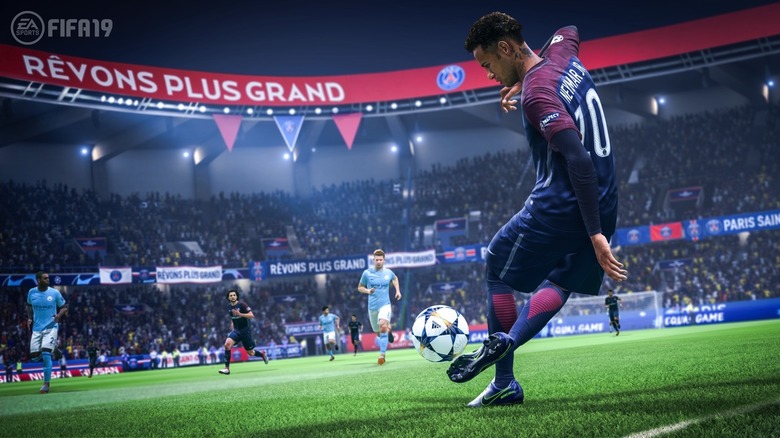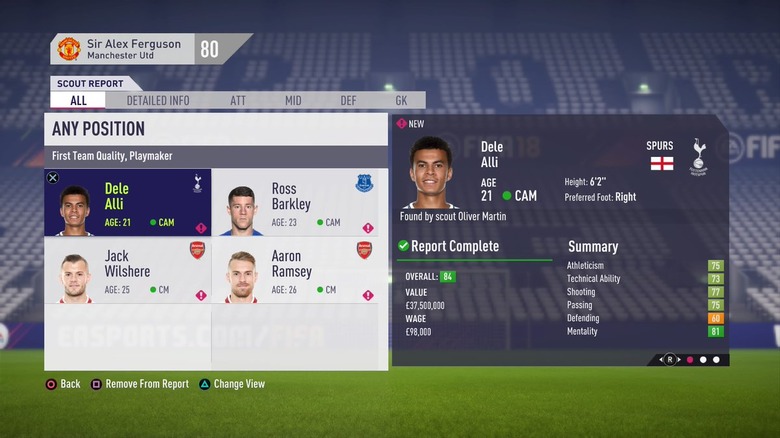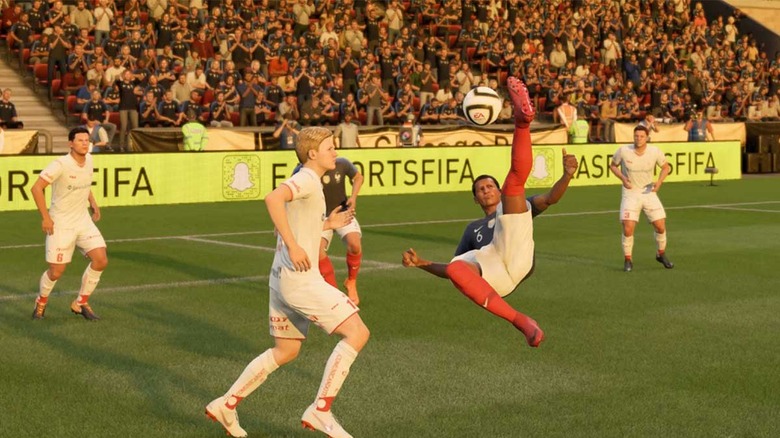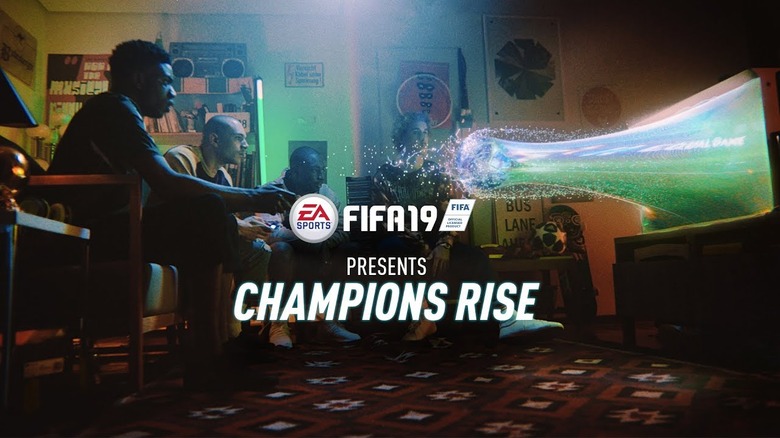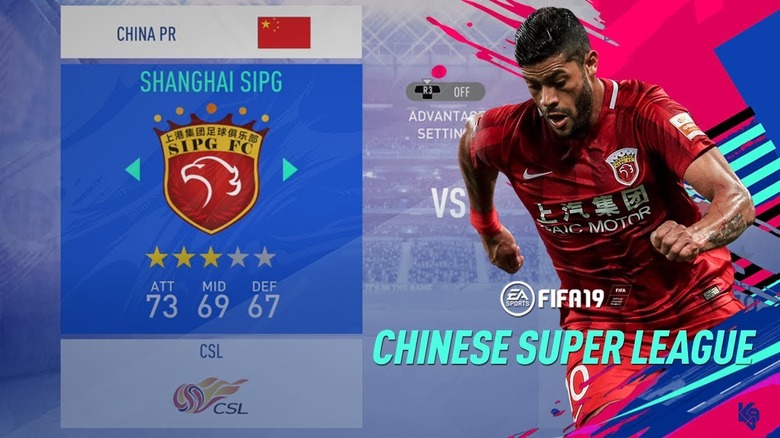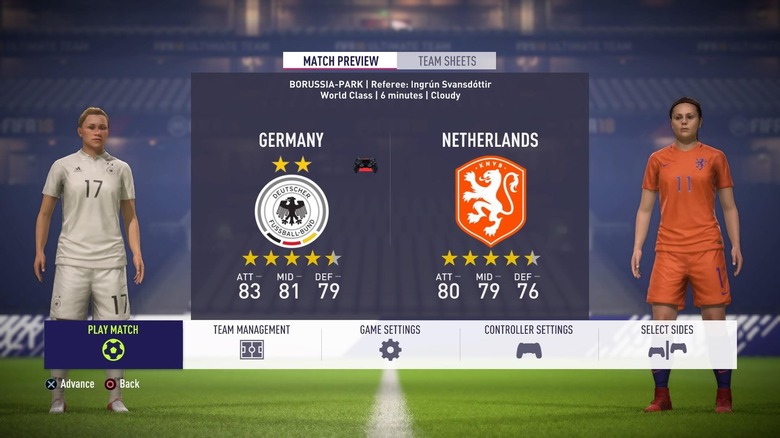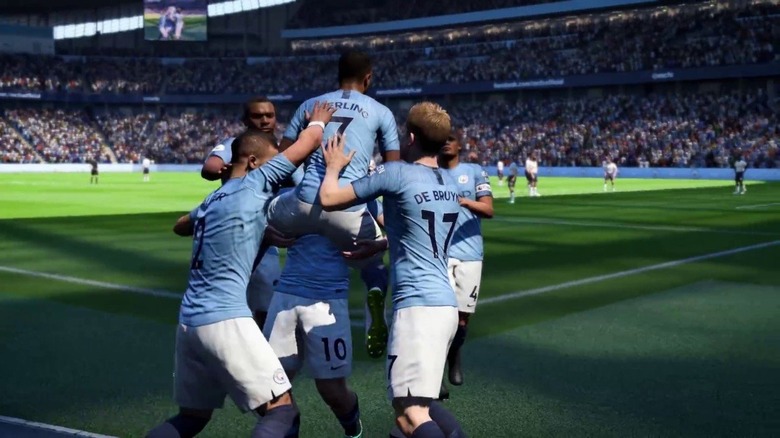What Other Games Can Learn From The FIFA Series
FIFA games are the undisputed kings of the sports video game world. With a fervent following of players numbering well into the millions and partnerships with some of the world's largest sporting franchises, FIFA has long since settled the power struggle between itself and the Pro Evolution Soccer series and now simply makes moves to prevent any usurpers in the future.
That kind of dominance is impressive, but it's also a valuable learning experience for developers and games that want to do something similar in their genre. It's easy to dismiss FIFA as "just another" sports title, but that would be ignoring the many innovations and design decisions that have made the franchise so popular. There's a lot of insight to be gained in examining what makes the FIFA game series tick, and here's our list of just some of the lessons other games could learn from FIFA's sustained success.
Some people really, really love detail
FIFA has become one of the deepest sports games in the industry. Just taking a quick glimpse at what's on offer in FIFA 19 is enough to make any dedicated soccer fan seriously question if they're a true follower of the most beautiful game. Whether it's the massive roster of teams and players, each meticulously scouted and detailed in-game, or the impressive array of gameplay options, FIFA 19's depth is unparalleled in the world of sports video games.
Despite the sheer amount of things to do in the series, people rarely seem to be troubled by it. While other games struggle to present a multitude of options in a way that isn't overwhelming, FIFA has made options a part of the brand — something that other games could definitely learn to do better.
If the devil is in the details, then there's a soccer player somewhere in FIFA with horns. The series proves that people aren't afraid to go deep on the things they're passionate about, and that belief should extend pretty well into any genre of video game. Giving people the option to become enamored with the fine details is the first step in creating the kind of fan who cosplays, writes strategy articles for the fun of it, or founds communities for like-minded players.
If there's such a thing as too much content, FIFA would have found it by now. Since they haven't, we're pretty sure everyone is good to keep adding more detail to their games.
Aesthetic trumps realism
We've all heard the criticisms before: that games like Call of Duty or Battlefield portray elements of war that aren't necessarily accurate. While some of those portrayals are dubious at best, there is certainly a subsection of game development philosophy that strives to satisfy the most realistic interpretation of a given world.
You might think that the FIFA series, being what is essentially a sports simulation title, would adhere to this belief as well. In practice, though, EA has moved away from realistic representations of soccer in favor of something a little more flashy, taking some serious liberties with the way soccer is played professionally along the way.
FIFA ramps up offensive prowess and favors those willing to attack by a wide margin, to the criticism of some soccer devotees. The game also makes highlight reel, once-in-a-career goals look like they happen several times a game. Despite that, the game does feel more exciting as a result, with a bit of a quicker pace of play to it, and it's translated into a lot of success.
The next time a developer is debating between flash or accuracy, they might want to take a quick peek at what the FIFA series is up to. It's certainly working for EA.
Control is good
One of the first barriers for entry that games have — and many people fail to realize exists at all — is the control scheme. While people who play a lot of games likely won't struggle with controls very much, there's some consideration to be made for a simplistic control layout that makes a given title much more accessible.
FIFA is proof that you don't have to sacrifice one for the other, though, and it's an important lesson to learn. It's pretty easy to introduce someone to the initial controls of FIFA, as shooting, passing, tackling, sprinting, and even making crosses are just one-button inputs that don't require too much dexterity to pull off. People could reasonably have a competitive, interesting FIFA match if the combined experience of all parties involved was zero.
FIFA also has some of the most complex controls in the sports genre as well. There are just so many different ways to exert one's will on an opponent, whether it be a fancy nutmeg or a beautifully timed, exquisitely performed pass at just the right angle. Whatever a player wants out of FIFA when it comes to control, the game is willing to give it to them.
FIFA's control extends beyond gameplay, too. Players can change teams, manage them, create tournaments, and more. While this level of control complements the game's depth, it's something that has been a proven selling point in the FIFA franchise and is apparently a major influence in purchasing decisions from gamers.
Having a famous spokesperson helps a lot more than you'd think
FIFA goes a step further than most in integrating its celebrity endorsements into the fabric of the game's narrative. FIFA 19 recruited three of soccer's biggest superstars to appear in commercials and covers for the game, employing Mbappe, Neymar Jr., and Ronaldo to help move copies. Beyond that, though, Ronaldo and Neymar Jr. are both characters within the game's story mode, offering advice to the player character and providing challenges as well.
Having somebody you look up to tell you a game is great is one thing, but having the ability to virtually rub shoulders with them is something else. It does come with its own risks, though, as Ronaldo switched teams mid-way through the marketing campaign for FIFA 19 this past year, forcing EA to change its cover, campaign, and in-game story as a result.
Still, the risk seems worth the reward. FIFA gets celebrity endorsements in a way that most games don't seem to understand at this point, and integrating celebrities into the fabric of a game is a great way to appeal to gamers who might have been on the fence about a specific title.
It's not like other games don't do this too, but it's hard to argue that a few celebrities tangentially related to the game they like are as effective as three of the biggest superstars in the world.
Make new fans welcome
Making new fans welcome is a philosophy that will apply differently to every game, but the mindset is important to discuss. One of the sneaky things FIFA does extremely well is providing just enough of a taste of what the game can be for those who learn its more complex intricacies while also keeping things light enough to interest new players.
FIFA, as a series, features games that have a relatively easy initial learning curve that belie a deep, dark hole of mechanical perfection that more dedicated fans can fall down later in their play experience. Beyond that, though, the games are extraordinarily good at creating a new culture among fans. FIFA plays up how much teams and players mean to those who follow them, and this in turn leads to new players choosing their own favorites, causing them to learn more about the actual sport itself — a phenomenon that the UK-based news outlet The Guardian actually covered a few years ago.
Creating a culture that feeds itself by creating more passionate fans, who then recruit their friends, is something that every game would love to be able to do. While it's not always as easy as having ready-made, real-world equivalents to the in-game content, FIFA's creation of a digitial fan culture has put it at the forefront of franchises who have won over dedicated, consistently invested fans. It's a philosophy that other games cannot afford to miss.
Story mode matters
It's a bizarre twist of fate that one of the franchises steadfastly proving that story mode matters is a series that didn't have one for the first decade-plus of its existence. When most people think of story mode mattering, they think of sprawling RPG titles like The Witcher 3: Wild Hunt. Sports games, although they have been known to include a few attribute systems and skill trees within their campaign modes, are rarely in the discussion for narrative strength.
A funny thing happened on the way to the soccer video game throne, though, and FIFA inadvertently created one of the best single-player campaigns a sports game has ever seen. EA then capitalized on this by keeping fans engaged with The Journey, a story following a young aspiring footy talent. People have bought yearly iterations of the FIFA series in order to follow the story and make choices during the gameplay mode, and that's something FIFA didn't have going for it earlier.
While other games are seemingly looking to scale back the amount of effort put into producing single-player content (Call of Duty springs to mind), FIFA is a strong reminder that story mode content can create a buzz amongst fans and make them more interested in yearly offerings that might otherwise be easier to ignore every now and then.
Go global
One of the selling points about games is often their world design. Creating a place that has a varied environment, diverse people, and different stories behind them is an easy way to engage players and keep them craving more.
FIFA doesn't really have that option, although the series does a great job of recreating the stadiums that have become famous in soccer lore. What the franchise does instead is address the fact that it isn't just in-game worlds that are diverse, but the actual hordes of people buying the games as well.
FIFA is a global game. It includes content that is interesting to smaller, niche audiences as well as the core demographics the game appeals to, meaning that the less popular but nevertheless beloved American MLS league makes an appearance despite having a much less storied history than something like La Liga. The series attempts to appeal to as many people as it can without reducing the quality of its content, and its diversity in representation is likely a big reason for its staying power.
FIFA recognizes that it has a massive audience, and does its best to make sure there's something for everyone. While that's not feasible for every title, it's an approach that more games, especially ones that are particularly North American-centric, could certainly do with adopting in future iterations.
Above all else, focus on wish fulfillment and fun
It might seem obvious, but we honestly think very few video game franchises do wish fulfillment and fun better than FIFA. When it comes down to it, one of the most crucial exercises in video game design and development is answering the question: "Is this game fun to play?"
As it turns out, yes, FIFA is an absolute blast. The series is one giant "be a superstar" philosophy broken up into different iterations of that mentality, and all of them are designed to be as fun as possible given the constraints. If you want to live out an imaginary life where you're one of the best soccer players in the world rising through the ranks in Europe, it's there for you. If you'd rather prove your prowess as a manager, running an efficient machine of a team, that's there too.
There aren't annoying or plodding parts of any FIFA mode. Everything is designed to be fun quickly and to make the player feel powerful or talented. There are teams from all over the planet, players for everyone, and a bevy of different ways to enact whatever your specific vision of soccer is.
RPGs in particular could learn from this approach, especially those looking to innovate. Perhaps starting with powerful characters whose skills are deep and available early, rather than the traditional hours-long process of becoming even adequate, is something to consider. Being strong right from the start certainly hasn't harmed FIFA any.

